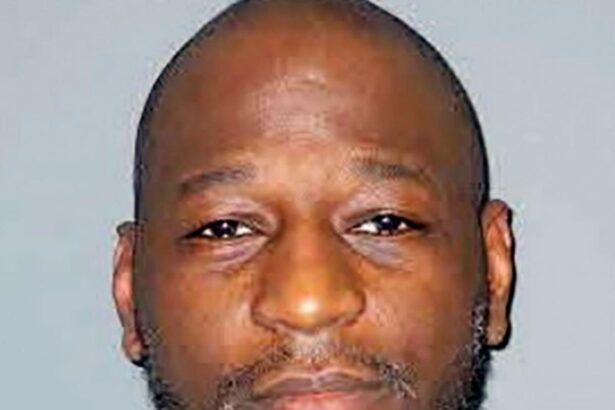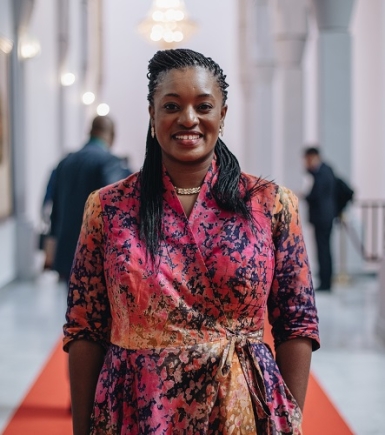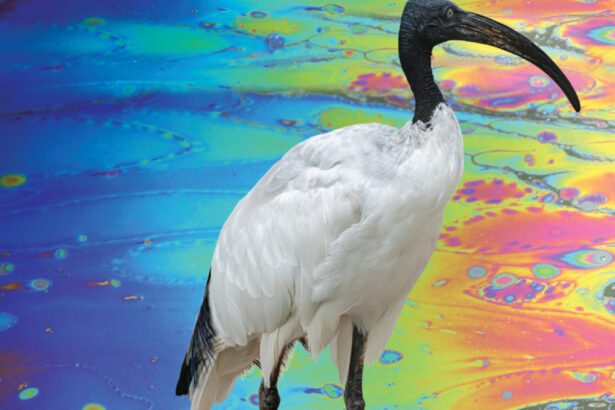Valerie Labi is revolutionizing transportation in Ghana and beyond by producing electric bikes that operate on rechargeable batteries.
Driven by a passion for environmental sustainability, her eco-friendly bikes can cover up to 140 kilometers on a single charge, enabling delivery riders to complete a full day’s work. She has partnered with delivery companies like Glovo and Bolt to create a petrol-free fleet of bikes, enhancing service delivery with speed and convenience.
Image: Delivery riders and some investors together
At her company and workshop, Wahu Mobility in Spintex, Accra, skilled workers design and construct each electric bike. Additionally, apart from being a leader and entrepreneur, Ms. Labi is a family-oriented individual and is married with three children.

Image: Valerie Labi and her children
She holds a Bachelor of Science degree in Economics from Southampton University and a master’s degree in Sustainability Leadership from Cambridge University, both in the United Kingdom.
Her hobbies include playing the acoustic guitar, athletics, public speaking, traveling, and barbecue nights. She has traveled to 59 countries, recently visiting Hong Kong, Morocco, Portugal, and Spain for business and leisure.
Continue reading as The Mirror delves into the life of Ms. Labi and her start-up company established in 2020.

Image: Valerie Labi with her team
The Mirror: Who is Valerie?
Valerie Labi: I would describe myself as a social entrepreneur who believes industrialization is a path to economic development. Officially, my name is Valerie Abena Konyo Labi, alias Mrs. Dagadu.
I was given the chieftaincy title Gundugu Sabtanaa I by the Paramount woman Chief of the Dagbon traditional area in the Northern Region of Ghana, which means Queen of Toilets, due to my sanitation company, Sama Sama.
I was born and raised in Welwyn Garden City in the UK to Ghanaian parents, Mr Fred and Mrs. Ama Labi, both entrepreneurs. My husband, Nii Osah Dagadu, works as the Head of Sales at Old Mutual Insurance in Accra, and we have three children: Mawuko, Amerley, and Amartey.“`
Valerie Labi, a 2014 ‘Mandela Washington Fellow’, had the privilege of learning about leadership from notable figures such as the former President of the United States, Jimmy Carter.
Valerie acknowledges the support she received from her family and in-laws, who are also entrepreneurs. She shared her experiences of growing up, highlighting her time at Queenswood School in the United Kingdom, where she became the first black Head Girl. Her visit to Ghana left a lasting impression, motivating her to return to contribute to the country’s potential and economy.
Upon returning, Valerie worked in several companies, including Vodafone and Global Mamas. She also ventured into entrepreneurship in the sanitation sector, founding Clean Team in the Ashanti Region and Sama Sama in the Northern Region. These businesses provided innovative solutions for waste collection and management, demonstrating her early foray into social enterprise.
As a further testament to her entrepreneurial spirit, Valerie launched a mobility business to address transportation challenges in Ghana. This initiative involved the transformation of secondhand bicycles into electric bikes, tailored for the African road, in collaboration with her co-founder, Ghanaian Aerospace Engineer Quincy Agyapong.
Valerie’s dedication and innovation attracted partnerships with companies like Jumia and other delivery services, reflecting the impact of her work on the local economy and infrastructure.
The Mirror, a publication, conducted an interview with Valerie Labi, shedding light on her remarkable journey and her contributions to Ghana’s business landscape.
“`
Valerie Labi: Thankfully, I was connected to investors through Impact Hub Accra. At the time, sustainability was only really acknowledged by the Germans, and Dutch so they loved my idea and supported me with a grant with help from Impact Hub in Accra.
The Mirror: How has the journey been?
Valerie Labi: In the beginning, it was challenging because most people did not believe in my dream of electric mobility in Africa. However, with support from my amazing team and my board chairman, Peter Scwarzenbauer, we started building an Electric Vehicle zone. Currently, I have over 100 bikes in circulation, and we give the bikes on a ‘work and pay’ basis directly to delivery riders. The riders then pay GH¢300 weekly for two years before fully owning the bikes.
The Mirror: What is so special about your bikes?
Valerie Labi: Our bikes are all installed with trackers that are connected to our back-end system, so theft is unlikely. Also, unlike petrol vehicles that emit harmful chemicals such as carbon, electric vehicles do not. They are eco-friendly and cost-effective, and our bikes take just about three hours to fully charge. The rider also gets insurance, assured work, and no need for a license, maintenance, helmet, lock, gloves, accessories and training.
The Mirror: What does the future hold for you and your business?
Valerie Labi: The future is certainly great with electric mobility. Thankfully, we also make some revenue from tracking how many kilometers our rider’s ride. We then sell those kilometers (tokens) in the form of ‘carbon avoided’ to international governments. This was an initiative brokered by the Environmental Protection Agency and we hope to reach 250,000 delivery riders by 2030. Works are also in place to expand the warehouse into an e-bike factory where we will work with other electric vehicle companies and offer training to engineers. We also have branches in Togo and Zambia and, hopefully, we will expand globally soon.
The Mirror: Have you encountered any major challenges?
Valerie Labi, a Ghanaian entrepreneur, shared her top challenges as fundraising, government policy clarity, and retaining skilled employees due to the tough economic climate in an interview with The Mirror. She expressed concerns about the brain drain as many young people aspire to move abroad and highlighted the importance of companies like Wahu Mobility in retaining local talent. Apart from her business endeavors, she mentioned her love for exploring cultures, observing behaviors, and mentoring young entrepreneurs in her free time. The information was sourced from graphic.com.gh.




